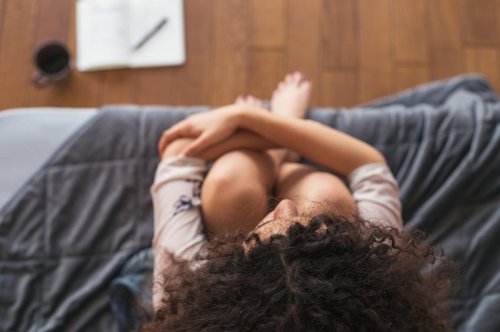I cured my insomnia by training myself to sleep like a baby
An estimated 70 million American adults suffer from sleep disorders—and doctors say behavioral modification is more effective than drugs in treating it. Here's what happened when one editor tried a holistic approach to curing her own.

Mornings have always been my jam. I’ve never been a night owl, and actually find waking up at the crack of dawn is the only way I can work out and practice self-care—and as I’ve officially entered the phase of my life when burnout is a very real possibility, I’ve come to value this time more and more as a sanity saver. Making all this magic happen, however, is really contingent upon my being able to go to bed at a reasonable hour—something that’s not always easy living in a city that never sleeps.
So when I developed insomnia last year—and went from hitting the gym to hitting my snooze button—I was thrown into a serious funk. No longer was I able to take baths before work, host solo dance parties, or just, you know, get a little bit of time to reboot and recharge.
I needed a plan and found one in something called sleep hygiene, a holistic approach to improving shut-eye that involves taking simple steps throughout your day.
Eager to have my mornings back, I started looking for a fix that would put me to sleep—without popping any pills. I needed a plan and found one in something called sleep hygiene, a holistic approach to improving shut-eye that involves taking simple steps throughout your day to make it easier to fall asleep at night. Just as, say, oral hygiene is a habit (you do brush twice a day, right?), the idea here is to routinize the lead-up to getting your zzz’s.
Turns out it’s actually not as crazy-slash-hard to clean up your bedtime routine and become a morning person as you think. Here’s the expert-approved (and completely holistic) guide to curing insomnia, getting to bed early, or just not hating your morning wake-up time with the help of sleep training.

The science of “sleep hygiene”
Being unable to sleep is a relatively common issue in America—the Centers for Disease Control and Prevention consider insufficient sleep a public health concern, estimating that upwards of 70 million American adults suffer from some form of sleep disorder.
If you’re having a hard time falling asleep, more often than not it’s your circadian rhythm—the 24-hour biological clock your body naturally follows—rather than, say, your Saturn return that’s causing your issues, says Shelby Harris, PsyD, director of behavioral sleep medicine for the Sleep-Wake Disorders Center at Montefiore Medical Center in New York City.
“Your circadian rhythm’s built into every cell,” she explains. “So if you’re not keeping a regular schedule in your life with going to bed and waking up, you actually throw your cellular body clocks off.”
Most people need between six and nine hours of rest daily, and Dr. Harris says the best way to tell the number of zzz’s your body needs is to “go to bed around the same time every night for a week, but wake up without an alarm clock. By days four, five, six, you’ll start to see how much [sleep] on average you need.” Use that number to create a schedule, and then stick to it—even on weekends. (It’s like sleep training for adults, instead of babies.) And because every body is different, Dr. Harris says there’s no ideal bedtime.
“Your circadian rhythm’s built into every cell. So if you’re not keeping a regular schedule in your life, you actually throw your cellular body clocks off.”
For example, I decided to start turning in at 9:20 every night and wake up at 5:20 a.m.—my thought being that even if I snoozed, I’d still be able to start my mornings by 5:30. (I also stopped drinking alcohol and coffee after 7 p.m. and no longer took my phone or my laptop with me when I crawled between my sheets—all of which have been shown to disrupt sleep patterns.)
Dr. Harris says all these steps fall under the category of sleep hygiene, which is part of something bigger called cognitive behavioral therapy for insomnia or CBT-I, a holistic approach to treating sleep disorders that’s actually more effective than the taking medication in the long run. “It’s just easier to take a pill,” she explains.
And while the only thing you have to worry about becoming addicted to with this method is an uninterrupted REM cycle, “cleaning up your sleep hygiene alone might not be enough to cure chronic insomnia,” Dr. Harris cautions—in which case it’s best to seek out professional help. But by just keeping a set schedule, your body should know around when to fall asleep and when to wake up everyday.
My insomnia went away about three weeks after I cleaned up my sleep hygiene. It’s been almost two years since I went from tossing and turning every night to getting a solid eight hours of shut eye—and both my circadian tempo (and morning dance breaks) are now fully back in rhythm.
For help overhauling your own sleep hygiene, a sleep doctor shares her nighttime routine. And here are 7 things to do when you can’t sleep.
This story was originally published on April 18, 2017; it was updated on July 13, 2018.
Sign Up for Our Daily Newsletter
Get all the latest in wellness, trends, food, fitness, beauty, and more delivered right to your inbox.
Got it, you've been added to our email list.










